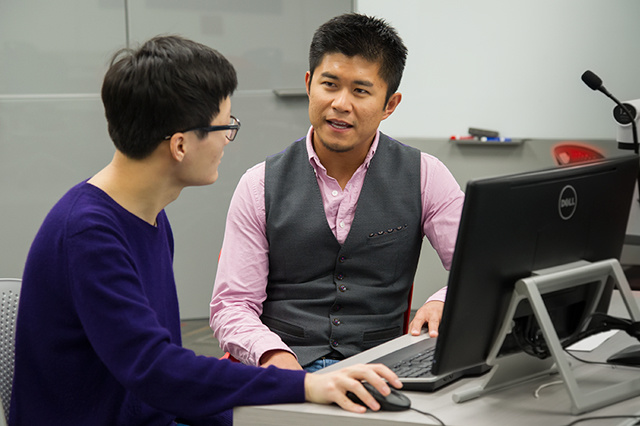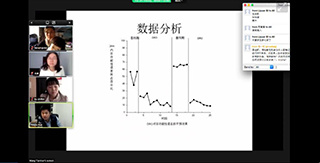This article originally appeared on the UI College of Education website

Youjia Hua (right) goes over teaching plans with Chengan Yuan in the Lindquist Center.
When a parent of a child with autism in China attempts to take his or her child to a public school, chances are they’ll be turned away.
“The principal will likely say ‘I’m sorry, your child has a disability and we can’t accommodate’,” says Youjia Hua, an associate professor of special education.
“There is a law in China that every child has a right to an education, but it’s a toothless tiger — no one enforces it,” Hua says. “Parents are left to come up with solutions themselves and often take on the task of educating their children themselves.”
Hua says special education is a relatively new phenomenon in his home country.
Although empirical evidence shows that a system called Applied Behavior Analysis (ABA) is an effective means of educating children with autism and other intellectual disabilities, there is not a higher education program in all of China preparing teachers to use ABA.
China is not alone in its need for better special education teacher training. Worldwide, there are only approximately 200 programs producing professionals certified by the Behavior Analyst Certification Board® and most are in the United States.
That’s where Hua comes in.
Hua and two other faculty members from institutions in New Zealand and Pennsylvania have created the first-ever course sequence training Chinese educators and parents to be Board Certified Assistant Behavior Analysts®.
ABA is a systematic way of approaching students with disabilities. It starts with assessment and involves making decisions and designing Individualized Education Plans based on data.
Chengan Yuan was raised in China but educated in New Zealand. He is a Board Certified Behavior Analyst® and is now at the University of Iowa serving as Hua’s graduate assistant and pursuing a doctorate in special education.
Before he came to Iowa, he consulted in a special education center in China and saw the dire need for systematic professional training.
“When I walked into the center, I was literally in shock,” he says. “The practitioners didn’t know what to do. They were coming from a good heart, but what they were doing was not technical and sometimes this can be damaging.”
Yuan worked with the center director to model ABA in one case and was able to demonstrate the difference following the systematic approach could make for this student.
“When parents and the director saw a change in this student’s behavior, they saw the importance of the ABA system and were most grateful,” Yuan says.
Yuan is now helping teach one course in the sequence, which was offered for the first time last summer. Hua reports he currently has 30 students enrolled — 20 teachers and 10 parents.
“They are the most dedicated students I have ever seen,” Hua says. Students will complete the course sequence over one year. They’ll then be eligible to sit for an exam to become board certified. This will mark the first time the exam has been translated into Chinese and offered in China. Hua hopes it will be a first step in preparing a skilled workforce to more adequately serve the needs of China’s special education students.

Hua's students in China can interact remotely with Hua and each other, while viewing the same data, using ZOOM technology.
“It’s such a high demand area in China,” he says. “It’s rewarding to establish this new beginning for the students, teachers, and parents.”
Hua and his colleagues are in the process of creating a partnership with East China Normal University (ECNU) that will allow coursesequence students to obtain even more training.
ECNU is home to one of the most prestigious teacher training programs in China and one of only two that offers graduate coursework in special education. Hua’s students can combine the courses they’re taking through the University of Iowa with a series of courses at ECNU and earn a master’s degree in special education.
In March, Hua will host a conference supported by the UI’s International Programs to draw leaders from Chinese institutions of higher education, private schools, government agencies, and service providers to Iowa City to discuss special education collaborations in China and United States.
Hua says he’ll describe resources and success stories such as the UI REACH Program, a higher education opportunity for students with cognitive and learning disabilities.
“This will be the first collaboration in the area of special education that happens in a systematic way with permanent infrastructure,” Hua says.